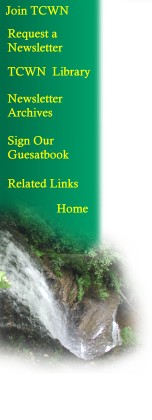

Einstein's statement reflects my belief. Our ancestors made tremendous sacrifices to give us the quality of life we enjoy today. History tells heartbreaking stories of the pain and suffering of the soldiers that fought for our freedoms. Though soldiers are still dying to maintain those freedoms, the sacrifices of battle have declined significantly. Now a new type of battle lies before us, between poor environmental practices and the Tennessee River. Unfortunately the monetary gains made by the battle to preserve the Tennessee River are nil in comparison to the monetary gains made by disregarding it. Therefore, it is difficult to get the support of politicians, companies, and corporations. Because no attempt to protect the river will be successful unless it belongs to everyone, the battle is mine. The Tennessee River cannot wait for politicians, companies, and corporations to take a positive, selfless interest in preserving it and neither can our children. The quality of life our forefathers bestowed upon us is declining, and unless we take an active role in cleaning up the river, future generations will suffer. I cannot draft another person into being a responsible steward for the river, but I can enlist myself.
The Tennessee River is the most beautiful river I have ever encountered. She is pleasing to the eye and engaging to the spirit. Her personality is feisty and unpredictable. Her history is lengthy and intense. Her waters touch my heart and move my soul.
Our disregard for her health is unacceptable. Polluted groundwater, illegal dumping, legal dumping, litter, and barren shoreline are her cancers. Ignorance and apathy our shame. Our forefathers fought courageously to give us a quality of life experienced by no other generation. Now we must make sacrifices of a different nature to heal and preserve what was handed down to us.
My mission is to swim the entire length of the Tennessee River. It is a pilgrimage to gain knowledge and intimate insight. I want to experience the characteristics that make her unique and the abuses destroying her waters and shoreline. Among people, I want my swim to generate interest and respect for her. I want people to gain an understanding of the importance of a healthy river, make the necessary sacrifices, and take responsibility for improving her waters and shoreline.
Pesticides and herbicides used carelessly or appropriately eventually filter into the river. Litter is dumped and/or washes into the river after a rain. Oil from the roads runs off into drains that dump into the river. Paint, beauty aids, household-cleaning supplies, automotive fluids, and a frightening array of paraphernalia are dumped down household drains, ultimately ending up in the river. All of these are poisoning the river. People need to understand that everything eventually ends up in our waterways, and everything we do has either a positive or negative effect on our environment. Even residues from the drugs we take end up in the river causing negative repercussions for the fish. In addition to poisoning the river, her natural shoreline, full of indigenous vegetation that protects her from erosion, is being destroyed by shortsighted landowners and being replaced with ineffective vegetation (grass). This act leaves the shoreline vulnerable to erosion and destroys the habitats of animals and fish. Fortunately, it is not too late to begin healing the Tennessee River. If people opt to take responsibility for her health, it will improve. The following are suggestions for people choosing to accept responsibility for the health of the river:
- Plant indigenous vegetation along the shoreline.
- Do not use pesticides or herbicides unless absolutely necessary.
- Recycle your automotive oil, and periodically check for and fix fluid
leaks.
- Dispose of hazardous waste appropriately...not down the drain.
- Reduce the amount of litter you create. Do not buy overpackaged goods.
- Get involved. Join national and local environmental groups. If you
do not have a local group start one. TVA will help.
- Be informed. Read literature outside your comfort zone. National environmental
groups publish informative magazines and/or newsletters to inform you
of environmental issues. NRDC (Natural Resource Defense Council), NCAMP
(National Coalition Against the Misuse of Pesticides), and the Sierra
Club have good publications. Ignorance is curable through reading, listening,
and questioning.
- Do not support companies or corporations that are environmentally irresponsible. Capitalists are in the business of making money. If we do not buy their products or services because of poor environmental practices, they will change their practices!
Since the earliest civilization, the Tennessee River has been the lifeblood of the Tennessee Valley. We have built cities on and around her and transported goods and ourselves upon her. We drink her water, eat her fish, water our crops, derive power, dump our waste, and play upon her the year round. Now she is a river "at risk". We take too much and give too little in return. It is time to change our environmental practices so our children can have the same quality of life our forefathers bequeathed to us. I accept responsibility. I enlist myself in the fight to maintain that quality of life. The Tennessee River beckons to us to help. Let us listen and respond.
Articles about Mimi Hughes: Chattanooga
Times-Free Press 8/11/99 |
![]()
Resources | Tapoco Project | About TCWN
About
TCWN / Join TCWN / Request
a Newsletter / Newsletter
Archives / TCWN Library / Calendar
/ Join
Our Email List
How You can Help
/ Sign Our Guestbook
Tennessee Clean Water Network
P.O. Box 1521
Knoxville, TN 37901
[email protected]